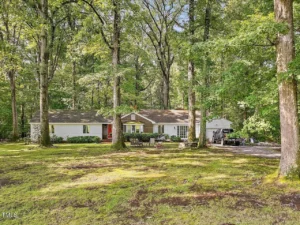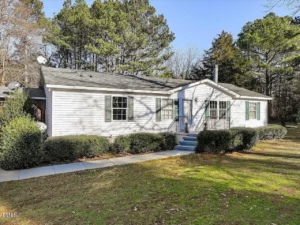Pittsboro NC Real Estate Agent Eric Andrews discusses repair negotiations. After an offer is made on a house, an inspection report usually comes in. These reports are 50+ pages long and full of details. The items to watch out for are major roof problems, HVAC, structural issues, foundations, crawl spaces, electrical, well & septic. These are expensive repairs which need attention. Less important items could include double taps, junction boxes, vapor barriers, GFCI outlets, leaky faucets, leaking gas, holes in siding. These are “usually” simple, minor repairs. Common issues which are rarely a big deal: Mold, grading, roof age.
Speaker 1: Tell us about repair and negotiations.
Speaker 2: So, I mean, there’s all different kinds of things that will come up. I can tell you the important things. The important things are the expensive things. The roof, HVAC, structural, old electrical. Now we’re in a rural area, so well and septic. And then the biggest one that causes the most problems are crawl space foundations. So those are all things that if things come up, those can be very expensive repairs and need attention. Let me tell you, let tell you the common ones, like ahead of time, the stuff that always comes up, that you’re always getting. Cause when you get this report, the report’s going to be like 50 to 75 pages and the summary’s going to be like two or three pages, and you’re going to see all this long list of repairs and you’re going to go, oh, why did I ever buy this house?
And that as a seller, you’re going to be like, oh my God, this inspector tore me apart. Why? They’re required to disclose and go over these things. But some common things are double taps into your circuit breaker. So they’ll have two wires going into the same circuit. That’s a big no-no, but people cut corners. And that happens all the time. Junction boxes. You’ll have junction boxes in your attic and in your crawlspace that don’t have covers. I mean, it’s a 59 cent piece. Sometimes electricians get lazy. Sometimes they fall off, whatever, but that’s not a big deal. Vapor barriers. They’re either in the crawlspace, there is no vapor barrier or the vapor barriers been moved around and it’s not covering a hundred percent of the floor. So that’s a big one. Make sure the vapor barrier’s intact. GFCI. Homes that are older don’t have those GFCI.
It’s the outlets that have that circuit breaker already in them. They’re required to have those if they’re close to a wet area, like a sink, other outlets or they’re required if they’re outside. That’s current code, but maybe, you know, 30 years ago, it wasn’t a requirement. So that’ll come up on an inspection report all the time and then you can actually have an outlet next to the sink. That has one of those, but it’s not working. It’s not tripping. It’s not working effectively. Leaky faucets, gas leaks, which sounds really bad. But you know, those fittings and they come around with a special machine. And if any propane or gas is detected, that’s a bad thing.
Hole in the vinyl. You have a vinyl sided house and a mower went by the rock, hits it. And there’s a small hole that needs to be cocked and replace. That is an intrusion. So these are stuff that things come up all the time and they’re not that bad. There are some, there are some BS things that come up a lot that I’d like to go over and I’m going to sound like a bad guy for calling this BS. And I’m not saying the inspectors are bad, but these are things that buyers, buyers’ agents used to freak sellers out. And it’s more common that they’re, that they’re not a big deal, but they come across as being a big deal. So, first we hear about all the time is mold. Well, I’m here to tell you every single house in North Carolina has, maybe every single house in the world has mold.
I mean, we have mold. Whether or not your crawlspace is inundated with some black spore mold that really deadly or to kind of make you sick. That’s extremely rare. We’ve seen that a couple of times, but it doesn’t happen. But almost every single inspection report we get now, somebody says mold in the crawlspace. Well, that can happen. So just because you see that doesn’t mean you have to do $15,000 worth of work to the crawl space. I mean, it’s just, people need to do a little bit more research. The other one that we always get is grading. Well, it’s amazing to me that all these guys are building houses and they’re not doing the grading, right? But inspectors will always say, I don’t like the grading. Well, guess what? If you find a house and the inspector says he doesn’t like the grading, I’m not going to be able to get you the grading fixed, okay?
The grading is done. It already had move on and everything. So, you know, there are other things you can do to fix that. But that’s one that we get all the time, grading. Roof, you know, the roof is 20 years old. It’s got another 10, 15 years of life expectancy. Well, people say, see that. And they’re like, oh my God. Well guess what? Every roof has a certain amount of life expectancy. It’s just where on the scale you are, same thing with the HVAC. So, you know, the seller’s point is it’s performing its intended function, you know. There’s no leaks or anything, but the buyer’s point is, well, 10 years from now, I’m going to have to replace it. Yes. That’s home ownership, right? You got to replace a roof. So it’s just one of those things. And then one of the biggest ones I get in arguments about with inspectors are these weep screen holes.
So we got the faux rock that you see on the front of houses. And there’s some builders will tell you, or some inspectors will tell you got to put holes in there so the water gets out. But then some builders will say, if you put a hole there, the water will get in. So, you know, just have some common sense. You don’t need to redo the entire fake rock around the house just because it doesn’t have some weak street holes, but we can, there are some workarounds. You have to have common sense. And then the other one that we see a lot of is, we see a lot of people testing for it is radon. We usually don’t have a whole lot of radon issues here. I’m not even sure this, again, this sounds horrible, right? But I’m not even sure if it’s worthwhile to test for radon, unless you have some extenuating circumstances.
Speaker 1: It can be in countertops or something, like that.
Speaker 2: It can be on countertops. In Chatham county, you’re going to get it more in north Chatham when you see a lot of rock, then it’s a higher instance. And then if you have a basement, but you know, the new basements are really pretty well done. It’s the older basements that aren’t as ventilated as well. Radon is natural and happens all the time. It’s just, you have a situation that’s capturing the radon and making it a health concern. And then you have these measurements that come in and what the EPA says and what the home inspector says. And there are levels that the EPA sets, but then you can certainly find information that any radon is a bad thing. Well, then you can get into some impossible situations where you’re having people cure things that are fairly close to naturally occurring. So you just have to have a sense of reasonable, but people should know the important ones are the expensive ones, that common ones that happen all the time. And then there’s some ones that I think are just straight BS.





